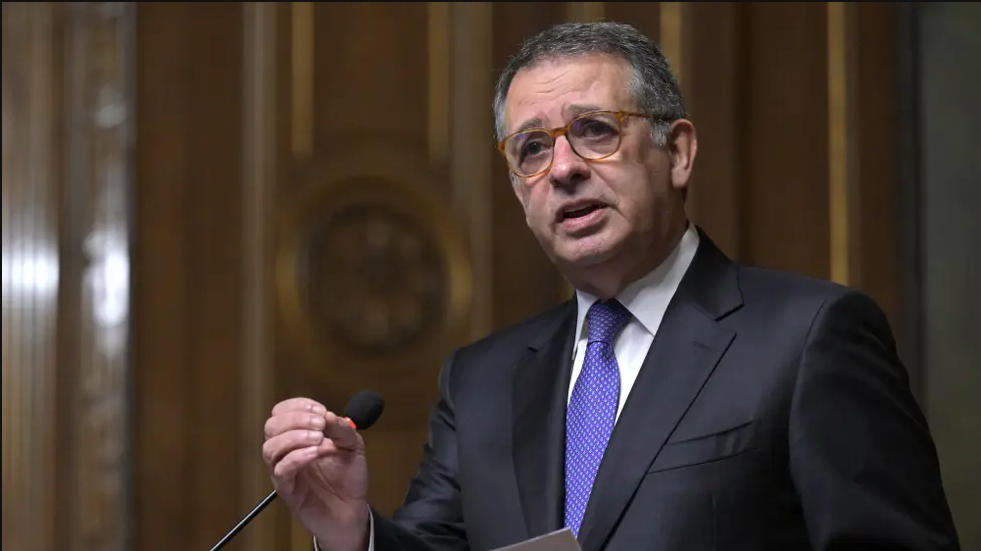The conclusion of the bill and its sending to the new parliamentary formation had been announced last week by the Minister of Culture, Pedro Adão e Silva, at Palácio da Ajuda, during the signing session of a memorandum between the Portuguese State and the Livraria Lello Foundation, which acquired the painting "Descent from the Cross" by Domingos Sequeira (1768-1837).
According to the presentation of the proposed law, it was drawn up with the aim of creating "a more favourable environment for private financial participation in culture". Last week, Pedro Adão e Silva considered that there was a "very significant delay" in the country in the area of cultural patronage, calling on private individuals to participate in culture, joining the "effort and responsibility of the State".
In the diploma, also previously announced by Pedro Adão e Silva, there is a proposal to create a Fund for the Acquisition of Works of Art for National Museums and Palaces with the aim of financing the acquisition of works of art by the State to "strengthen and value" these collections.
This Fund would be "financed by revenues from appropriations allocated to it by the State Budget and by the proceeds of fees, contributions or taxes allocated to it", including the possibility of receiving proceeds from inheritances, legacies, donations and donations.
Golden visa
In line with the reinforcement of this fund is the proposal to create a new residence permit for cultural investment - the so-called 'golden visas' - through "donations, in cash, in an amount equal to or greater than 500 thousand euros".
Another way to obtain this residence permit, according to the proposed law, is the "transfer of capital worth 250 thousand euros or more" that is applied to investment or support for artistic production or exhibition, recovery or maintenance of national cultural heritage".
Another mechanism that the diploma provides for is "Match Funding", a concept "that consists of an automated and complementary form of public or private financing, through which a public entity or a Foundation commits to finance, via non-refundable subsidy or donation, an activity or project registered on a crowdfunding platform, in an amount equivalent to a percentage of the funding that will be raised through the platform".
The objective is to create conditions and opportunities like the public fundraising campaign organized by the Museu Nacional de Arte Antiga, in Lisbon, in 2015-2016, which received funds to acquire the painting "Adoração dos Magos", by Domingos Sequeira, when it reached a total of 745,623.40 euros from civil society, far exceeding the 600 thousand euros needed for the acquisition, announced at the time.
This was the first campaign in Portugal to raise funds to acquire a work of art for a public museum, and included the contribution of thousands of individual citizens, institutions, companies, foundations, schools, parish councils and city councils, whose names are printed on canvas, at the height of the staircase leading to the floor that houses the painting, at the National Museum of Ancient Art.
Beneficiaries
As for the beneficiary entities in the new cultural patronage diploma, in addition to those currently provided for in the law, it is proposed that natural persons (artists, authors and musicians) with professional or business activity opened with the Tax and Customs Authority will be covered, in function of the respective Economic Activity Code (CAE).
It also provides for the expansion of entities that pursue profit-making purposes, that develop activities predominantly of a cultural nature, and include those that, whether for-profit or non-profit, develop cinematographic exhibition activities.
Along these lines, the proposed law also aims to clarify eligible patronage support, "in order to distinguish patronage support from commercial sponsorship", with patronage donations being considered to be those directed to "eligible beneficiary entities, in cash or in kind, and without compensation of a pecuniary or commercial nature".
Other foreseen donations are the “transmission of the right to use a movable or immovable asset, without the transfer of the respective ownership right, for the carrying out, by an eligible beneficiary entity, of cultural activity, donations of services provided by the patron in the normal course of their business or professional activity, and the temporary provision of human resources, free of charge”.
In a text presenting these proposals, to which Lusa had access, the authority emphasizes that the diploma "aims to promote the sharing of responsibilities between the State, civil society and the private sector in the development of cultural policies and the promotion of artistic creation".
"This co-responsibility is essential to correct a profound asymmetry between public investment and private investment in the cultural sector, bringing the involvement of Portuguese private companies closer to what is the European standard", the document reads.
Finally, what is intended, "is to carry out a profound review of cultural patronage in order to make it more attractive to companies, more open to different types of patronage and less bureaucratic in its application", he argues.
















My humble apologies for such negativity however. This smells very much like our original Golden Visa policies:
(A.) The ‘Art’ of Selling Portuguese Passports.
(B.) More money laundering operations.
(C.) What got us into trouble in the first place vis-à-vis, radical fall in both financials and general quality of life for the natives.
By Miguel from Lisbon on 27 Mar 2024, 12:03
This would seem to be just another way for people to buy their way in to Portugal. Another system closed to would-be applicants who aren't rich.
By Jim O'Connell from Algarve on 30 Mar 2024, 13:16